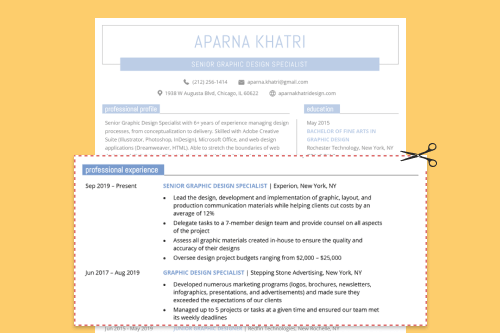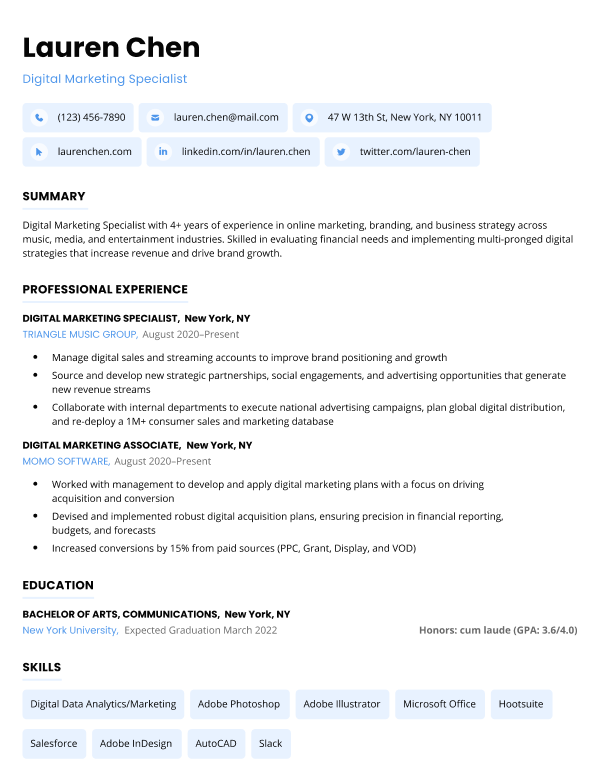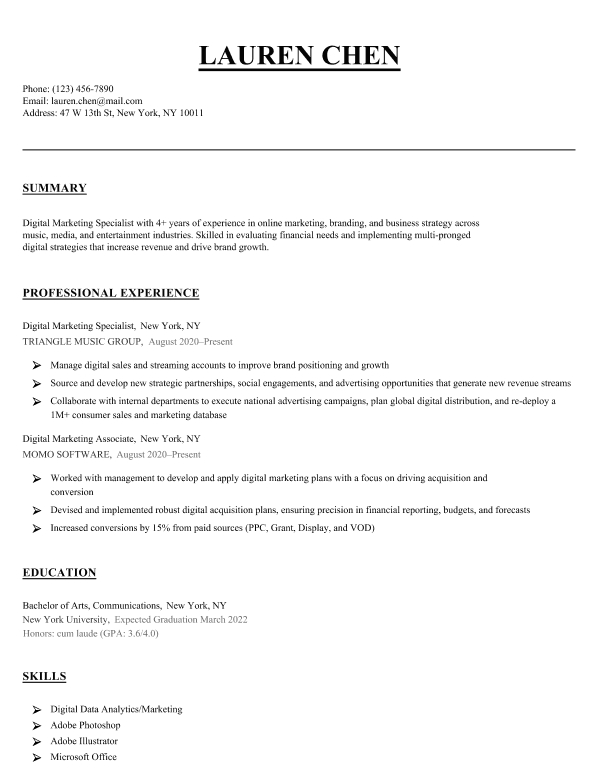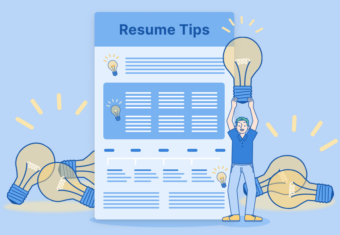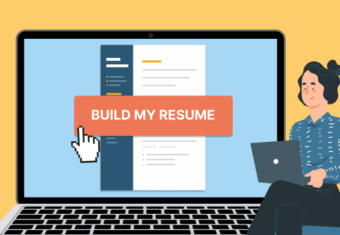You should list all the jobs you’ve had that are relevant to the position you’re applying for. Usually, you’ll list 2–4 jobs on your resume, but that number can change based on your experience level.
You don’t have to put every job you’ve ever had on your resume. Instead of looking impressive, too many jobs can tell a recruiter that:
- you’re overqualified, especially if you’re applying for an entry-level job
- the skills you’ve picked up are now outdated
- you’re a job hopper
If you’re unsure how far back your resume should go, focus on your most recent positions. These jobs are usually more relevant and give a good indication of your skill level.
Our free-to-use resume builder can make you a resume in as little as 5 minutes. Just pick the template you want, and our software will format everything for you.
How to tell if a past job is relevant
To decide if a job is relevant:
- find the skills you’ll need to fit the position in the job posting
- jot these skills down in one column on a page
- write a second column with examples of when you used these skills in the past
- add the positions in which you used the relevant skills to your resume’s work experience section
Update your resume by removing jobs that are over 15 years old, unless the job ad requests your full work history.
How to list your roles if you’ve had many jobs
If you have tons of relevant work experience, you can still put it all on a succinct resume. Here’s how:
1. Write a two-page resume
Though one-page resumes are typically best because they provide the most concise look at your qualifications, you can write a resume that’s longer if you’re an experienced job seeker with 10+ years of work history and are applying to senior or management roles.
Two-page resumes let you space job entries out. If you try to squeeze too many jobs onto one page, your resume will be hard to read.
Just ensure you have enough information to fill both pages. Also, fit key information (like recent jobs) onto the first page to make a strong first impression. You can leave less important resume parts like your certifications list or education section for the second page.
If you write a multi-page resume, add your contact information to all the pages. Then the hiring manager can easily find your contact details even if the pages get separated.
2. Combine relevant experience
Group similar jobs together under one resume work history entry to save space.
For example, if you’ve had three jobs in customer service, combine them below one heading like this:
CUSTOMER SERVICE
- Sales Assistant, Crate and Barrel, August 2016–May 2017
- Call Center Agent, AT&T, March 2013–June 2016
- Sales Intern, Shopify, July 2012–February 2013
You can also learn how to show promotions on your resume to group multiple jobs at the same company.
3. Include an additional experience section
Removing jobs from your resume can create gaps in your work history. A long period of inactivity is a red flag on a resume for hiring managers because it could mean your skills are outdated or that you were fired and had trouble re-entering the workforce.
A clever way to explain employment gaps on your resume is to add an additional experience section. An additional experience section gives you room to combine jobs that aren’t related to each other or list any unpaid work you’ve done.
When you describe your additional experience, be brief to save space, like this:
ADDITIONAL EXPERIENCE
- Lab Technician, Oakridge Facility, 01–09/2020: Analyzed medical samples
- Intern, Milford Industries, 03/2017–07/2018: Researched and assisted senior lab technicians
What to do when you lack relevant experience
Are you in the early stages of your career or writing a resume for your first job?. Here are three tips on how to improve your resume to show hiring managers you’re qualified:
1. Add related volunteer work or internships
Highlight relevant internships and volunteer activities. Such experiences can show the hiring manager that you have the skills and work ethic they’re looking for.
When you put internship or volunteer work on your resume, showcase notable skills or achievements from those experiences, using hard numbers and examples to show hiring managers what you can do.
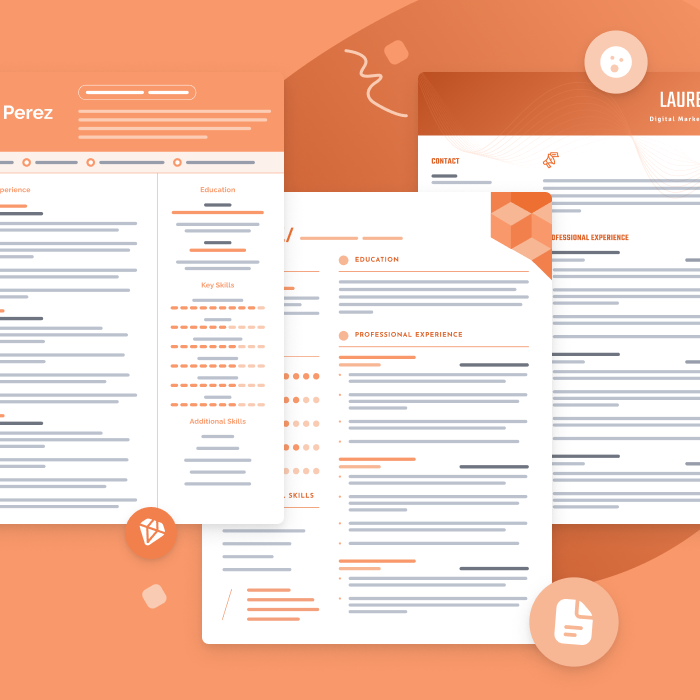
The best resume templates for 2024
One of the best ways to make your resume is by filling out one of our free resume templates. All our templates are designed by experts and free to download for Microsoft Word or Google Docs.
2. Describe relevant coursework
Adding relevant coursework on your resume is a great way to make up for a lack of professional experience. Describing your classwork shows employers that you’ll bring up-to-date industry knowledge to the position.
But only feature courses directly relate to the job you want. For example, a module on web analytics could catch the employer’s eye if you’re applying for a Digital Marketer position.
Find skills-based words and phrases in the job ad, and list coursework that includes those keywords. Adding keywords from the job description helps your resume get through applicant tracking systems (ATS) that many companies use to automatically sort applications.
Place your relevant coursework section under your education section, and format it as a bulleted list of the major topics the courses covered. Include any skills you learned or academic achievements you earned.
Here’s an example of a good relevant coursework section:
RELATED COURSEWORK
- Economics: Studied microeconomics and macroeconomics, learning how to predict market movement and earning second place in the Columbia University FDIC Academic Challenge (2020-2021)
- Business Analytics: Practiced creating strategies for maximizing organizational success in strong, weak, and volatile markets
3. Focus on your skills
If you’re switching careers or writing a resume with no experience, draw attention to your transferable skills. By focusing on your skills, you can justify why you’re qualified for a job even if you have no experience in the field. For example:
You have work history in retail that seems irrelevant if you’re applying for a teaching job. But the communication skills you learned as a floor manager are valuable for commanding a classroom.
The best way to highlight your skills is by writing a functional resume.
Unlike the standard chronological resume, the functional resume format uses skills categories instead of job subheadings. Bullet points under the headings give examples of how you’ve successfully applied your skills. Here’s a good example of a functional resume’s skills section:
Skills on a Functional Resume
CUSTOMER SERVICE
- Receive a +95% on customer service feedback surveys on a consistent basis by providing a friendly in-store environment
- Enhance the customer experience by providing quality assistance and in-depth product knowledge
- Educate customers on up-and-coming brands and the latest fashion trends
SALES
- Exceeded sales goals an average of 10% for 5 straight months
- Upsell customers through the recommendation of products that meet their specific needs
- Process 30+ customer transactions a day and factored sales, discounts, and promotions into the final price
MERCHANDISING
- Restock and organize new shipments of inventory in a timely manner, cutting average of 2 days off the merchandising process
- Develop and create unique displays that attract customers to a desired product
- Team worker who is able to adapt in highly dynamic and changing situations in the office
Use a functional resume to show recruiters that you’re a strong candidate, even if you don’t have any industry-specific experience.
Click to rate this article
4.3 Average rating


